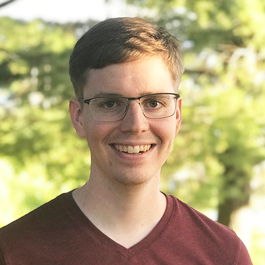
Developing Sustainable Materials
When Kyle McCall began his PhD program in applied physics at Northwestern University, he was expecting to exclusively do physics research. However, he was persuaded to attend a chemistry recruitment session and saw a talk by Professor Mercouri Kanatzidis, who became one of his two PhD advisors and set him on a path to develop smarter, more sustainable materials.
“One of the things that I really liked about my particular PhD was that I had two advisors: a material science and a chemistry advisor.” His material science advisor, Walter P. Murphy Professor Emeritus Bruce Wessels, develops thin films and nanostructures for electronic, magnetic, and photonic materials applications. McCall’s chemistry advisor, Charles E. and Emma H. Morrison Professor of Chemistry Mercouri Kanatzidis, Director of the Center for Advanced Materials for Energy and the Environment (CAMEE) at the Institute for Sustainability and Energy at Northwestern (ISEN), explores the design of new materials—particularly solar photovoltaic materials, thermoelectric materials, nanostructured materials, and more. McCall had the opportunity to learn from each advisor and “connect the physics and the chemistry aspects of the research. For me, that was pretty valuable: being able to speak on both sides of the coin and try to make connections.” Navigating the divides between disciplines has readied McCall for academia, teaching multidisciplinary courses, and to be an advisor himself as assistant professor of Materials Science and Engineering at the University of Texas-Dallas (UTD).
McCall intends to expand upon his research at Northwestern, which was primarily in making radiation detector materials, and combine it with his desire to work in sustainability. His goal is to find new semiconductors for energy applications, from solar energy conversion to radiation detection to more efficient light devices. He primarily focuses on materials that can convert solar energy into electrical energy and is developing new compounds that can either act as a solar panel or convert sunlight into a more useable form of energy—ideally something that is more efficient, potentially cheaper, and stable enough to be mass produced. “For example, in solar cells, you need a very thick layer of silicon to fully absorb sunlight. Whereas using a series of different materials, you only need about 100 nanometers, which is about 100 times less actual material for this absorber layer. This gives you some cost benefit, obviously, because you don't need as much material, but it can also lead to higher efficiencies since charge carriers don’t have to travel so far to be collected.”
“I'm excited to direct my research towards sustainability and choose more specifically areas where I think I can impact. To take the wheel and choose sustainability is the main source of pride right now as I start my new laboratory.” – Kyle McCall, assistant professor at UT-Dallas
The opportunity to make contributions toward sustainability inspires McCall’s research and teaching. “I'm excited to direct my research towards sustainability and choose more specifically areas where I think I can impact. To take the wheel and choose sustainability is the main source of pride right now as I start my new laboratory.” This spring, he is teaching “Materials Science for Sustainable Energy”, which provides an overview of the global energy landscape and introduces the various advances in materials science relevant to increased sustainability. “The course hasn’t run since 2016 at UTD and serves to introduce the materials science of energy to an interdisciplinary group of students (it has been cross-listed with the Physics and Mechanical Engineering departments).” McCall, with his interdisciplinary education during his PhD, is particularly well-equipped to deliver the course.
In many ways, McCall is building upon his experience at Northwestern. And now that he is on the other side of the desk, advising students, he feels prepared and is enjoying it. “I’m at an early stage in my career, but an exciting thing for me is getting to impart the things that I've learned and, at the same time, see how far I've come. I hope to be able to mentor these students in the same way that that I was mentored.” McCall goes on to say that because academia is a very competitive field, the people you surround yourself are very important. “The PhD is a four-to-five-year program. This is a big chunk of your life. You want to make sure you have good support and relationships with your lab group and advisors. And be sure to seek out alternative mentorship. You may find that your scientific adviser isn't the only person you would talk to about other research questions, so being able to have that mentorship in multiple ways is important to getting to the finish line.”
At the end of the day, McCall reiterates how important it is to keep your options open and explore new opportunities. “I wouldn’t have found Mercouri if not for a bit of luck of my own.”